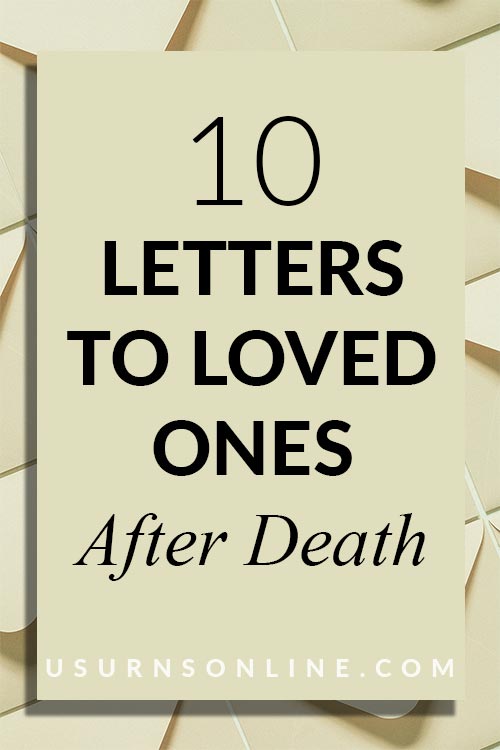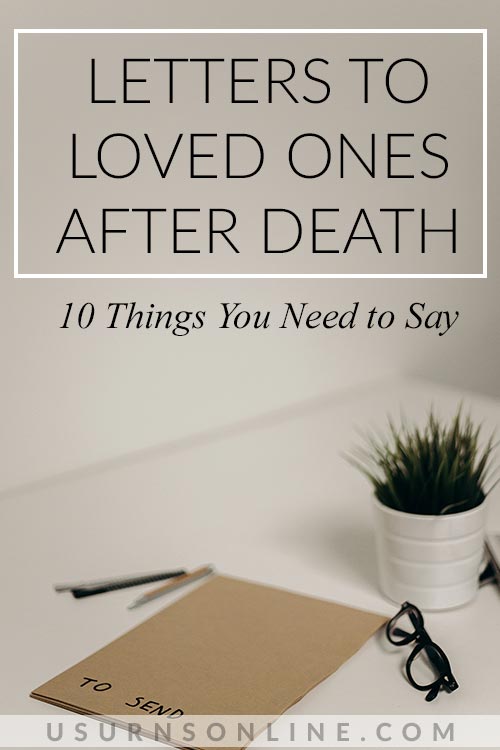Have you ever received an “end of life letter?” Unfortunately, not everyone gets the opportunity to receive a last letter from a loved one. Have you ever thought about writing one and how it would impact someone after you are gone?
Should you write a final letter when you’re healthy and vibrant? Or should you wait until you are sick and dying? Should you write it down, record your voice, or leave a video behind?
Fortunately, if you are reading this, you probably have time to put together some final words for your loved ones. Here’s why, how, and some ideas on what to say.
Leaving Letters After Death
There are many reasons why you may want to write a letter to your loved ones.
You aren’t the communicative type. It’s easier to write your thoughts than to speak them out loud. Sometimes you can say things in writing that you might not say in person. Or perhaps there are things you’ve long meant to say, but for whatever reason have been unable to do so.
You want to keep your memory “alive.” For example, if you have young children, this is a way to interact with them when they are older long after you’re gone.
You want to give comfort to the ones you are leaving behind. By writing a final letter, or by making a video or audio recording, the thoughtfulness alone with offer great comfort to your family and loved ones. There is much you can say to provide comfort; the best is simply to say that you love them and are proud of them.
You want to make your last wishes and personal instructions known. This can be anything from practical guidance (questions about life support, funeral arrangements, burial vs cremation) to instructions for the future (educational plans and goals for cultivating virtue in your children, your legacy, a desire for your spouse to find happiness and remarry if desired) to whatever else you may want to include in your final wishes.
Ultimately, writing letters to your loved ones in the event of your death does two things: It gives you peace of mind, and it provides comfort and direction to those you care about most.
What to Include in “Open When I Die” Letters
Death is always a surprise, even if you are expecting it. You never think, “today is the day.” It might be tomorrow or next week, but never today. And of course, tomorrow is always tomorrow and next week is always a week away.
Urns Made in the USA
So with that being said, why put off writing that “goodbye” letter? Please do it now, while you have the chance.
Things to consider including:
- Healthcare decisions and end-of-life instructions.
- What your life has been like to date: stories, hopes and dreams for the future, thoughts on the meaning of life.
- A list of accounts, logins, and passwords.
- Your family history and the legacy you would like your family to carry on.
- Assure your loved ones that your love for them will never cease to exist. You are gone from their sight, but your love is not.
- Give some life advice. For example: “Live your lives with strength and love,” “speak my name often,” or even “I am sorry I had to go.”
- Make sure you provide for your pets.
- It’s ok to feel anger at me. After all, I left you.
- Let your children know that you are proud of them, and you know they’ll accomplish great things.
- Recognize your loved one’s qualities, such as kindness, loyalty, and humor.
- Write about a specific time or incident that comes to mind.
- Encouragement to be grateful for every day they may have left on this earth.
- List your hopes and dreams for your loved ones.
How to Write a Goodbye Letter When Dying
How do you know what to say in a goodbye letter? Be personal and specific when you share your feelings; however, try to keep it simple.
Goodbye Letter Tips
- Be honest about your illness, diagnosis, and prognosis.
- Keep your letter to a single page in length. You can go longer, but brief is good. It will help you focus on what is important.
- Handwritten is nice but not always legible.
- Typing a goodbye letter is ideal, you can sign it and add a personal note such as “I love you.”
- If you don’t feel like writing or typing a letter, make a voice recording.
- If you don’t want to make a voice recording, you can make a video.
Goodbye Letter Template
Dear [name or endearment],
The doctor’s diagnosis is clear, and my time here is short. There are some things I want you to know.
First of all, I love you and I am so proud of you.
I love you for all the ways you….. [etc]
I am proud of you for….. [etc]
Now let me get practical for a moment and talk about my final days, funeral arrangements, and financial/household matters….. [etc]
For the kids, as we’ve talked about so much, we want them to….. [discuss education, instilling virtue, faith, and practical considerations]. I will write a letter to each of them, but please be sure to tell [list names] for me that I love them and miss them and I am so proud of them.
Some things are easily forgotten, so I wanted to write down our family’s story. [Talk about your family history and heritage, childhood, early years of marriage and stories from the children’s younger years]
Dearest, you mean the world to me. I admire your…. [list character qualities]. I want you to be happy. Mourn me, and miss me, but know that it’s ok to move on even as you honor me in your memories. [Discuss relationships/remarriage/it’s ok to let go]
Most important of all, and it can’t be said enough to mean all that I feel – I love you.
Always yours,
[Signature]
Things to Know if You are Making a Video
- Wear clothing that reflects who you are.
- Choose a setting with good lighting and minimal ambient noise.
- Don’t wear stripes – it could make your video appear blurred.
- Feel free to be somber, creative, or lighthearted.
- Write out a script, or at least some notes beforehand. This way you will be sure to say everything you wish to say.
This is your video; there is no right or wrong way to do it. Just be yourself.
10 Things to Say to Your Family Before You Die
1. “I’m proud of you for….”
- Who you are, no matter what you do.
- The brilliant things you will accomplish in the future.
- I am proud that I could call you “friend.” (Or son, daughter, wife, husband, etc)
- The way you love others and always put their needs before your own.
2. “Thank you for….”
- Giving my life purpose and joy.
- For being my spouse, friend, mentor, or any other relationship you are thankful for.
- Our children.
- The way you were always there for me
3. “Please forgive me for….”
- Things I have said or done that have hurt you.
- Things I have not said or not done that hurt you or hindered you.
- Because I didn’t let you know how much I appreciated you. (This can pertain to a spouse, children, friends, or co-workers.)
- My past failures, such as…
4. “Congratulations on….”
- Their life’s achievements. First steps, riding a bicycle, straight A’s, and so on.
- Either big or small events, congratulations are always in order!
- Overcoming challenges – including the amazing life you’re living without a (father, mother) around.
- If you have young children, you can offer future congratulations on their first job, first kiss, graduation, marriage, children, and more.
5. “I am sorry for….”
- Leaving this world without you.
- Leaving you to raise our children alone.
- All of our future plans that are not going to happen.
- The emotional toil this has put you through.
6. “I trust you with….”
- Raising our children.
- Making good financial decisions.
- Doing your best in life.
- Living responsibly, while also following your dreams.
7. “Goodbye to….”
- List the people you want to be included in your final goodbye. Family, friends, or co-workers.
- Your fur babies.
- Your “favorite” places. For example, the beach, your favorite restaurant, or your favorite park.
- “… but only for a little while, for I know we will meet again in heaven.”
8. “Remember to….”
- Celebrate the life we shared and all the good times we had together.
- There is no set timeline for grieving. Take your time.
- Focus on the good things and look to the future even as you mourn my death.
- It’s ok (or it’s not ok) to date. But, again, this is something you may want to discuss with your spouse in person.
9. “What I appreciate most about you is….”
- Your thoughtfulness and integrity.
- You had loved me when I was unlovable.
- How you take care of our children. You put our kids ahead of yourself and everyone else.
- Your passion for life.
10. “I love you.”
- Every moment, including all the times I didn’t say it or act that way.
- I love you for the way you made me laugh, for the adventures we had, for the memories we share, for just being there.
- My love for you will never fade.
- I will always love you.
Whether you call them end-of-life letters, goodbye letters, or final letters, whether you make an audio or video recording, it will provide so much comfort to your loved ones.
A final, personal touch like this will mean the world to those left behind. It will be something they will cherish forever.
Your last letter is about the people that are left behind; therefore, it is a last act of love to them. Remember, life goes on for them without you.
So create a special message that they can read after your death. It is a beautiful way to keep you alive in their minds and hearts while providing comfort, reassuring instructions, and expressions of your love.
Pin It






I always thought of this but didn’t know how. Thank you so much. This definitely inspired me on how to get started.
I have been making my wishes a common conversation with my Sons. My Junior son, during our conversation, did not want my home, so I paid him off, giving my Oldest son the home and two cars. I am ok with this, and it allows them to know everything is settled, and both agree to the terms. What a blessing to have things settled before the end. My Junior asked what to do with my ashes, I replied, ” Spread them on I55 on your way going south to your home, I don’t care as I will be coming back as you will recognize not as ashes”. The three of us are satisficed with our decisions.
I want my ashes to go to both of of son what size urns would I need
Hi Hope,
Most adult urns hold 200 cubic inches of remains. You can use two adult urns when dividing the ashes, or you can go with smaller urns that hold around 100 cubic inches.
I won’t do this but I’m tempted to write the truth to some…how horrible they were, how selfish and uncaring. How I don’t want them around to pretend they cared, and how I don’t care for them after all the crap they’ve dished on me. Oh, so tempting!!